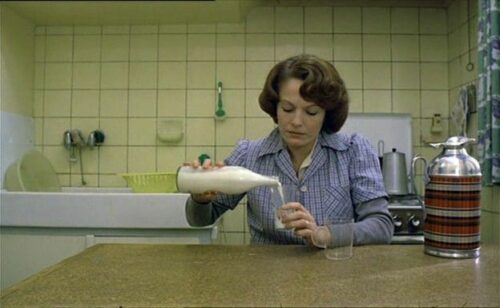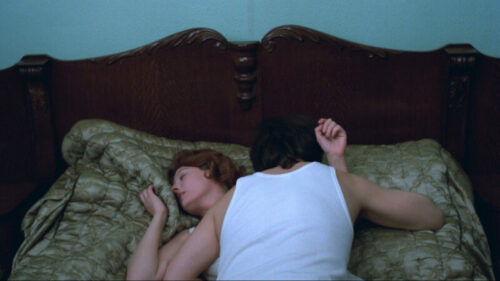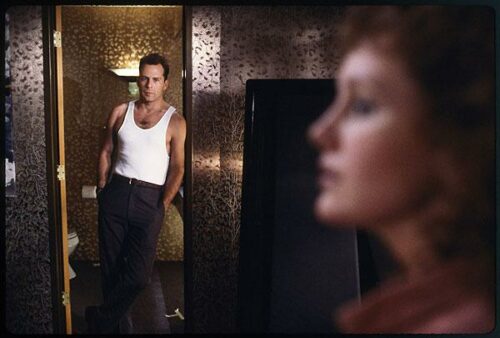I dimly recall, some brief months following the birth of Stand By For Mind Control, Sight & Sound publishing their decennial movie list, and writing something or other about it. And it’s true. I did. Since then, I even managed to see all the movies in the top ten I’d never seen. Now, ten years later, they’ve got a new list, and those lousy bastards went and stuck in two more movies I’ve never seen. The nerve! Worse yet, one of them is number one, and comes with what must be the least-possible-to-remember title in cinema history: Jeanne Dielman, 23 quai du Commerce, 1080 Bruxelles. Really rolls off the tongue. Well, I figured, guess I’d better— THREE AND A HALF HOURS?! For the love of–!
Okay. Fine. Lawrence of Arabia is the same length, and that didn’t even make the top 100. Which we’ll just take a moment to think on that. Lawrence of Arabia, in a poll of filmmakers, critics, and, this year, anyway, many other somewhat tangential-to-the-world-of-cinema persons, did not make enough lists to reach the top 100. One must assume many of these people, knowing it’s a movie about a white British solider in WWI doing unpleasant things, have never bothered watching it. Do they imagine it’s racist? Imperialist? Do they not know what a devestating critique of, mostly, everything it is? Sigh.
But so anyway. Jeanne Dielman, etc. Let’s take a look.

Twelve thousand years later…
It’s not a short movie. It’s the kind of movie where the whole point is to make you feel every passing minute, every passing second. Where every second feels like a minute, every minute an hour, every hour another year of your all too brief time on this earth slipping irretrieveably by. Of late, this sort of thing even has a name: Slow Cinema. Because lord knows we need some more genre names to better file and sort things. Humans love sorting and categorizing. Directors like Kelly Reichardt and Gus Van Sant are clearly influenced by this sort of thing.
We might also call it by a more general name: Slice of life. In this case, writer/director Chantal Akerman set out to show what it was to be a woman back in the those heady days of 1975, and to do it in a way not done before.
I think she succeeded. The film consists of carefully framed, static shots. The camera never moves. Cuts are infrequent. Most scenes involve Jeanne (Delphine Seyrig) simply going about her day-to-day life. We watch her do dishes, make meatloaf, ride up an elevator, walk down the street, eat dinner, talk to her almost adult son, buy potatoes, have sex for money with her cilents. All part of the routine. Her husband died some years ago. Once a day, one of her clients arrives to have sex. She keeps the money in a bowl on her dining room table.

The movie takes place over three days. About an hour and forty minutes into things, Jeanne gets flustered. It’s really the biggest change in the entire movie. She keeps doing what she’s been doing. But she’s not quite with it. Her hair is slightly mussed. She overcooks her potatoes. Isn’t quite sure what to do with them. She peels new potatoes. But her mind is elsewhere. And then… And then things continue.
The most disappointing part of the movie is the end. I won’t spoil it. One begins to fear it’s coming, and then it does, and it could be the ending to any Hollywood movie. It’s just a bit… trite. For me, it pretty much ruined what comes before. It’s a movie that aggressively aims to chronicle what’s never chronicled in film (or certainly hadn’t ever been at the time in ’75), the day to day routine of a woman, where watching her sit in a chair in her living room, motionless, with nothing to do, for minutes on end, constitutes a scene. A real power is evoked through this monotony, especially when that slight disturbance alters everything midway through. The ending undercuts it. I can see how it’s meant as a rebuke to men and the world they’ve created and what that world has done to Jeanne, that this is what it’s driven her to, that her facade has to break, somehow. But it’s a movie rebuke. It’s feels stylistically unrelated to the movie leading up to it.
Well. Maybe that’s just me. As for the three hours ten minutes of movie that do lead up to the end, I was impressed by its execution. But I didn’t much enjoy it. All told, it’s the kind of movie that annoys me in a very particular way, the kind where without question you could write a book on its meaning and importance, yet where actually sitting through it is a chore. The kind of movie meant less to be watched than discussed (Godard, I’m looking at you).
Why, then, does it appear on more Sight & Sound voters’ top ten lists than any other movie? Is it because, in the world of films directed by women, it’s widely thought the best, and for anyone making sure to include at least one woman director on their list, this was the obvious choice? Or is it really that beloved? Maybe it is. To me, it’s like a lot of movies that end up in the top 100: Impressive, important, but not especially compelling to sit through. Which I think matters. To me, the best movies are movies I can watch over and over again, always finding something new to appreciate, movies that hold my attention raptly, where if I happen to watch the first ten minutes, I will watch the whole thing, because there’s no way to stop myself. Movies that insist they be watched.
What would my top ten be? Impossible to say! It’s an impossible task! I’m impressed anyone at all can make such a list for Sight & Sound. But they do. And even thinking about making one, you realize that its impossibility is, at least a little bit, freeing. You’re going to get it wrong. It can’t be done. So, okay then. Include whatever you want. Yet still… it’s for Sight & Sound. People will talk about this list. You’d feel foolish not putting down some obvious heavy-hitters. There’s some pressure here.
The result is a very curious form of top 100 list. We see this list and we think, oh, look at that, here’s what the top 100 movies are, as voted on by some very serious movie-people. But it’s not that. It’s not a top 100 movies list. It’s a top 100 top ten movies list. Which is a very different thing. Imagine if voters were asked to name their top 100 movies, and those lists were scored the same, one point per movie, and that was averaged out into the top 100. It would be a very different list. Among the usual greats, people would be free to include movies they just plain love. “Hell, I watch Die Hard every christmas, with 100 spots to fill, sure, I’ll put that down!” And suddenly we’d live in a world where Die Hard tops Citizen Kane. It would be a more honest list, I think, a list that reflected more what people actually watched over and over again, versus what they believe are important.

It’s a very strange top 100, anyway. No Altman, no Ashby, no Coens, no Allen, no Lumet, no Romero, no Jarmusch, no Monty Python, etc., etc. You could name 100 of the best movies ever made that weren’t on this list without breaking a sweat. The Sight & Sound list should really stick to the top ten, and leave the rest a mystery. Or just supply a list of every other title voted for, without ranking them. Because that’s what they’re polling: the top ten. If they want to spread things out, they should do another poll in five years, also to be repeated every ten, of the same voters’ top 50 films, and average out a top 50 list.
Meanwhile, I suppose, to make my bitching honest, I should check out the rest of the movies I haven’t seen on this list (or, you know, most of them. Can I take a pass on Shoah?). In the top ten there’s also Beau travail. At least that one clocks in at a refreshing 90 minutes. All told, I’ve seen 77 movies on the list. There’s also the directors’ top 100. I like that list better, on the whole. I’ve seen 82 of those. Which still leaves me–and, I bet, you too–plenty of VERY IMPORTANT movies left to watch.
I’ll get to them as soon as I finish watching Die Hard again.

Hey guys how’s it’s going? Hope you’re well. I ended up watching this after the list came out and found the ending didn’t fit either. I could tell it was coming too, it was telegraphed too easily which also didn’t fit with the film. Sort of turned into Hollywood film language almost.
It encouraged me to write a personl top 10 as well. Love all these.
Pan’s Labyrinth
Do The Right Thing
M
Vertigo
The Thin Red Line
Rashomon
The Godfather
Taxi Driver
Princess Mononoke
Network
Greetings, and happy things and stuff! Life is as well is one could hope in this strange future of ours. Movie watching continues unabated, though writing wise and/or unwise things about said movies has obviously been on a bit of a hiatus. Who knows what the new year will bring? More of the writings? Still less of them? We shall see.
Nice list you’ve got there. In the five or six unique top tens I could make, six of those would show up (never been into Pan’s Labyrinth (though I quite liked del Toro’s new Pinocchio), Taxi Driver impresses me and I like it, but it’s no Raging Bull (or After Hours), Vertigo I like, but Notorious is my favorite Hitchcock, and M is indeed excellent but probably just isn’t stuck in my head the way my favorites are).